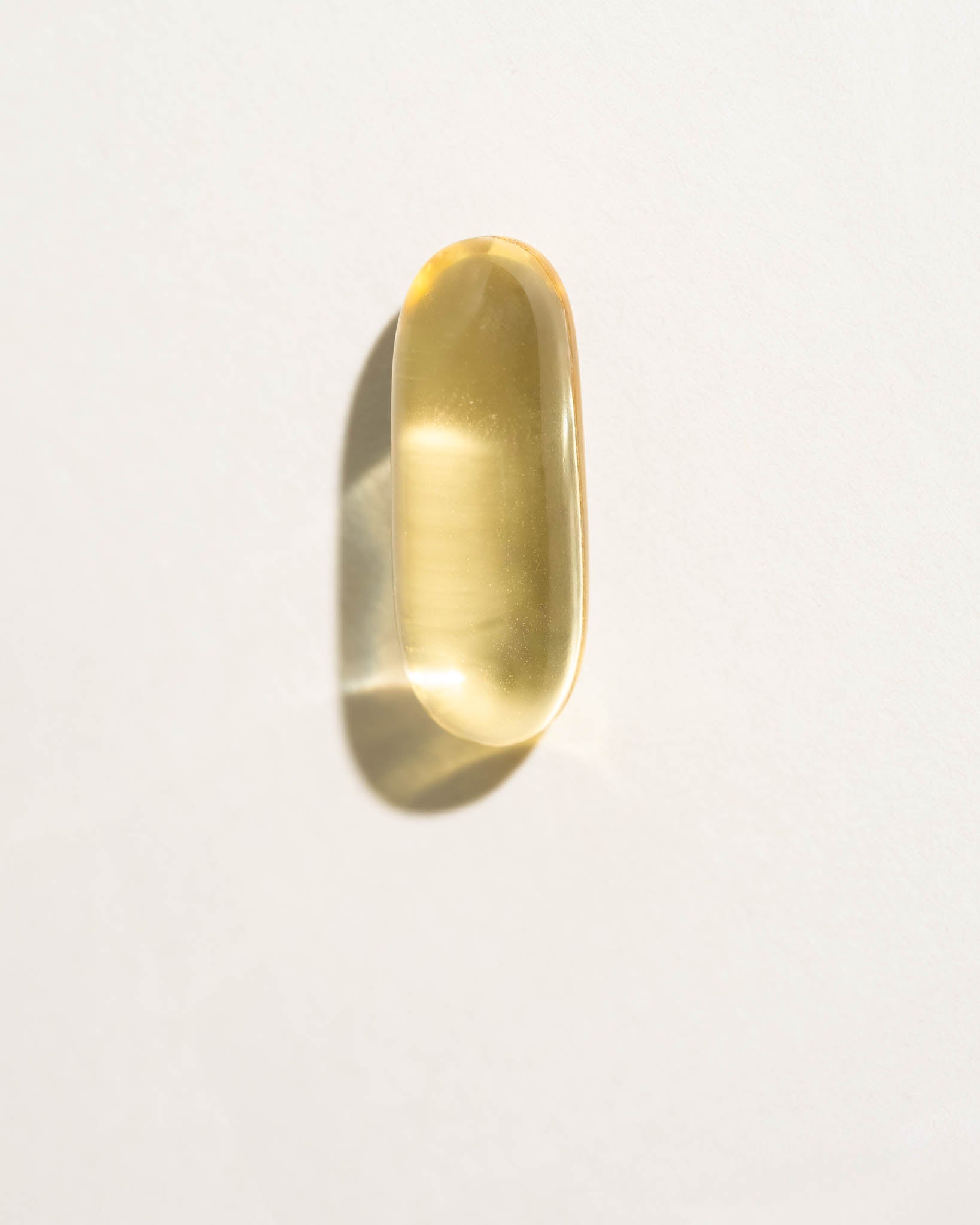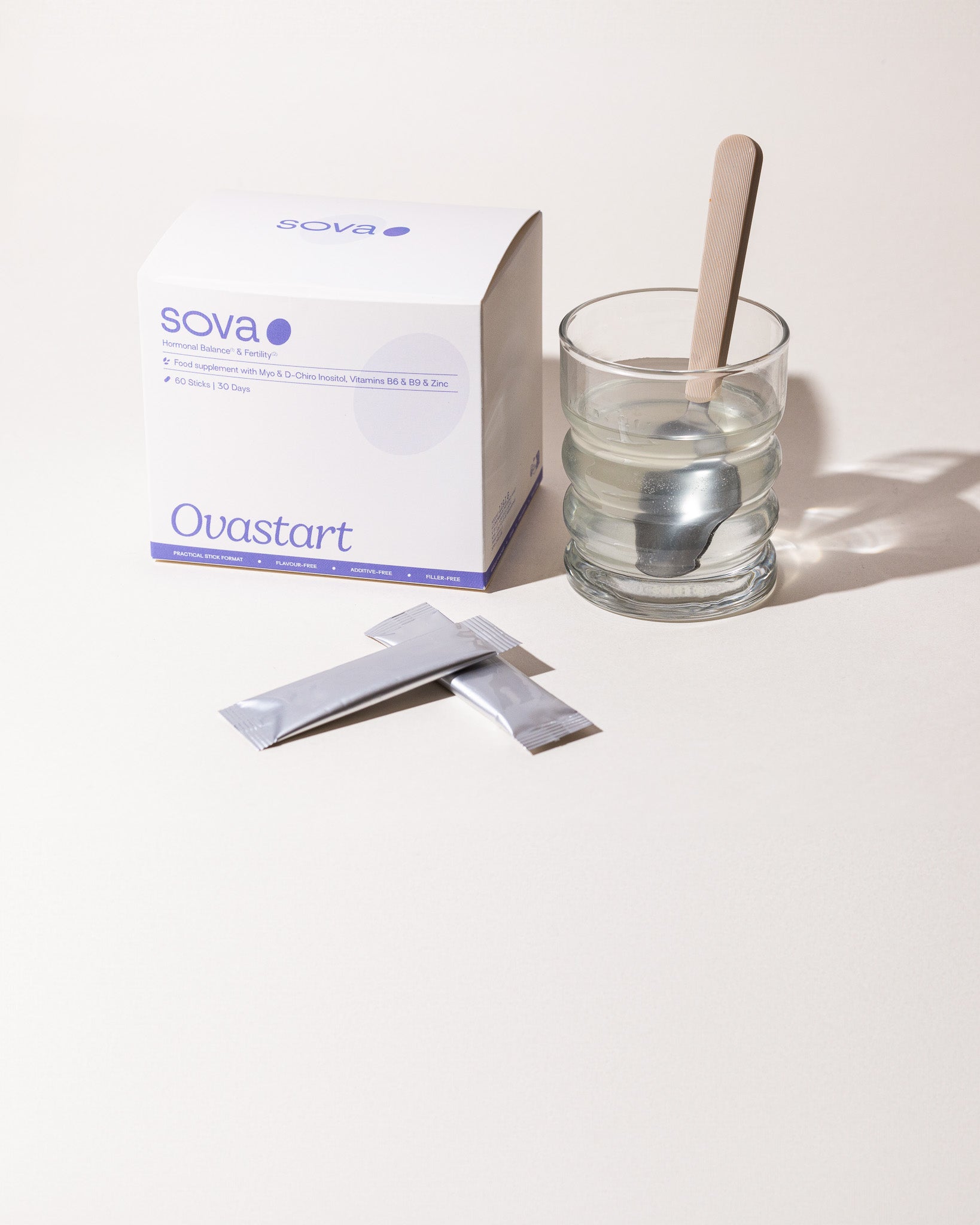Table of contents
- 01. The thyroid: conductor of your metabolism
- 02. What is hypothyroidism?
- 03. How is hypothyroidism diagnosed?
- 04. The case of Hashimoto's Thyroiditis
- 05. How the thyroid affects your cycle and PCOS
- 06. Natural solutions to support your thyroid and PCOS
- 07. What supplementation is recommended when hypothyroidism is associated with PCOS?
- 08. PCOS and hypothyroidism: interconnected issues?
You may have heard about the connection between PCOS and hypothyroidism but struggled to understand the relationship. Do you have hypothyroidism or Hashimoto’s disease but no one has explained its impact on PCOS? Or perhaps you’re unsure if your symptoms are caused by PCOS or hypothyroidism? In this article, we’ll break it down and explain how your thyroid can affect your menstrual cycle and PCOS.
👉 Not sure where to start? Take our free PCOS product quiz to get a personalised routine designed to support your hormones, thyroid, and overall balance.
The thyroid: conductor of your metabolism
The thyroid is a butterfly-shaped gland located in your neck, just below the Adam’s apple. This small but mighty gland secretes hormones that regulate your metabolism: body temperature, heart rate, digestion, and even your menstrual cycle.
Think of your thyroid as the conductor of your metabolism. It keeps your body’s rhythm in check, stimulating protein production throughout the body and helping oxygen reach your cells.
What is hypothyroidism?
The prefix "hypo" denotes a decrease or insufficiency, which means that in the case of hypothyroidism, your thyroid gland does not produce enough thyroid hormones. Consequently, your metabolism slows down because it is not stimulated enough by your thyroid hormones. Your body then seeks to restore balance by producing more Thyroid Stimulating Hormone (TSH), the hormone that stimulates the production of the thyroid hormones, namely, T3 and T4.
TSH is the hormone manufactured by the pituitary gland that regulates the production of thyroid hormones. If your body produces too many thyroid hormones, the pituitary gland will secrete less TSH (hyperthyroidism). Conversely, if your body does not produce enough, it will secrete more TSH (hypothyroidism). TSH acts as a sort of messenger instructing your thyroid gland to produce more or fewer thyroid hormones according to your body's needs.
Logically, the symptoms of hypothyroidism reflect the slowdown in your metabolism:
- Fatigue
- Irregular menstrual cycles
- Heavy periods
- Infertility
- Hair loss
- Dry skin
- Water retention
- Swollen face and eyelids
- Weight gain
- High cholesterol
- Sensitivity to cold
- Cold extremities (hands, feet)
- Constipation
- Brain fog
- Depression
How is hypothyroidism diagnosed?

We advise you to first make a list of the symptoms you are experiencing to discuss them with your general practitioner and/or endocrinologist. This will enable the doctor to conduct a clinical examination (observation of physical and psychological symptoms) and prescribe blood tests and/or establish a diagnosis.
To detect a thyroid disorder, the first thing measured in a blood test is usually TSH (Thyroid Stimulating Hormone). TSH is the hormone that regulates the production of thyroid hormones (mainly T3 and T4). Sometimes, the doctor may also include T3 and T4 measurements to further explore your thyroid function. Additionally, free T3 and free T4, which are forms of T3 and T4 that can be readily used by your body, may also be tested.
It’s worth noting that some experts, like Dr Benoît Claeys, argue that relying only on TSH may not always be accurate, as hypothyroidism can be present even when TSH levels are “normal”. Symptoms matter just as much as numbers.
Below is a comparison between standard health norms and current laboratory norms:
|
Hormones |
Health standards |
Laboratory standards |
|
TSH |
0,25 - 1,3 mUI/L |
0,3 - 4,3 mUI/L |
|
Free T3 |
3,5 - 4,5 pmol/L |
3,5 - 6,5 pmol/L |
|
Free T4 |
15 - 18 pmol/L |
9 - 26 pmol/L |
The French source "En finir avec l’hypothyroïdie, ce que votre médecin ne vous dit pas et que vous devez savoir" is from Dr. Benoît Claeys.
That's why Dr. Claeys relies almost exclusively on symptoms, which doctors call clinical examination, to diagnose hypothyroidism.
The case of Hashimoto's Thyroiditis
Hashimoto’s thyroiditis is an autoimmune form of hypothyroidism. In this condition, the immune system mistakenly attacks the thyroid gland, producing antibodies such as anti-TPO and anti-Tg. Over time, this leads to inflammation and reduced thyroid function.
A little side note: all diseases ending in -itis are primarily inflammatory diseases. This makes them chronic diseases as they are maintained by poor lifestyle habits (stress, lack of sleep, processed food, sedentary lifestyle, pollution, endocrine disruptors, etc.).
The diagnosis is almost the same as for hypothyroidism. Your doctor will perform a clinical examination (observation of symptoms) and prescribe a blood test to refine the diagnosis. What will change is that they will add measurements of your thyroid antibody levels: anti-thyroglobulin (TgAb) and anti-thyroid peroxidase (TPOAb). If either of these levels is high, it can be concluded that you have Hashimoto's thyroiditis.
How the thyroid affects your cycle and PCOS
If the thyroid is the conductor of our metabolism, and therefore of our body’s vital functions, it seems logical that it would have an influence on the menstrual cycle since it is one of the 5 vital signs of our body alongside heart rate, blood pressure, body temperature, and breathing.
Several studies have shown that production of follicles and triggering of ovulation are stimulated by thyroid hormones. Some researchers also suggest that the occurrence of ovarian cysts in case of hypothyroidism may be associated with elevated TSH levels. When TSH is high, it can activate FSH ovarian receptors (hormone that allows the creation of ovarian follicles). Therefore, hypothyroidism can lead to multifollicular ovaries, also known as polycystic ovaries.
Hypothyroidism may contribute to:
- Multifollicular ovaries (similar to PCOS), due to high TSH acting on ovarian receptors.
- Hyperprolactinaemia (high prolactin), which blocks ovulation — often seen in PCOS.
- Increased androgens (male hormones), leading to acne, hirsutism, or hair loss.
- Aggravated insulin resistance, a key PCOS driver.
- Excess oestrogen, which can worsen symptoms like heavy bleeding.
To determine if your PCOS is linked to hypothyroidism, consider this statistic: "40% of women with amenorrhea or hypothyroidism have hyperprolactinaemia (high prolactin)."
If you have been fortunate enough to have had a complete hormonal assessment, your prolactin levels can give you an indication of a potential link between your PCOS and hypothyroidism:
- If your prolactin level is high, it seems interesting to explore the possibility of hypothyroidism.
- If your prolactin level is normal, there may be no link between your PCOS and hypothyroidism.
In essence, if your prolactin is elevated, you are more likely to have hypothyroidism rather than PCOS since hypothyroidism can mimic PCOS symptoms. Therefore, it could be the underlying cause of your PCOS.
This is also true if your PCOS is associated with amenorrhea. Amenorrhea refers to the absence of menstruation for more than 3 months (with regular cycles) or more than 6 months (with irregular cycles).
From this perspective, we can differentiate between 2 types of PCOS:
- PCOS without amenorrhea: cycles are long (more than 35 days) but regular. For example, a woman who regularly has cycles of 35 to 45 days.
- PCOS with amenorrhea: absence of menstruation for several months. For example, a woman who has her period 2 to 3 times a year.
This information is intended to provide you with clues. You must always analyse the context and the different symptoms because there are other issues that can lead to hyperprolactinemia. Only your doctor can make a diagnosis. For your information, a normal prolactin level is between 5 and 20 ng/mL.
To help you see more clearly through this hormonal “mess”, here is a representative diagram of your hormonal system. The hypothalamus —part of your brain— and both the anterior and posterior pituitary gland—located just below your brain— communicate with other parts of your body (ovaries, thyroid, breasts, uterus, etc.). Therefore, you can understand that even a tiny hiccup in this mechanism can cause major damage.

Natural solutions to support your thyroid and PCOS
Review your lifestyle
Firstly, it is important to quickly assess the possible causes of your hypothyroidism.
Factors that can disrupt your thyroid:
- Micronutrient deficiency: iodine, iron, zinc, selenium, vitamin D, vitamin B12, manganese, molybdenum, vitamin E.
- Stress: busy work and life schedules, intense sporting activities, anxiety, depression, stress, trauma, lack of sleep, difficulty managing your emotions.
- Too much processed food or a diet that does not meet all your nutritional needs.
- Some medications, including contraceptive pills.
- Exposure to pollutants or endocrine disruptors.
- Poor digestion (constipation, diarrhoea, bloating, pain, reflux, heartburn).
- Sedentary lifestyle.
You could, from this list, define 1 to 3 main areas on which you could act daily.
Nutrition for thyroid support

We advise you to adopt a predominantly anti-inflammatory iodine-rich diet, especially if you have Hashimoto's thyroiditis.
You can learn more in our articles dedicated to the key rules of a diet adapted to your type of PCOS as well as our article dedicated to inflammatory PCOS.
You will find iodine in:
- Fish, seafood, seaweed, iodised salt
- Protein-rich foods (eggs, salmon, legumes) to boost L-Tyrosine
- Brazil nuts (rich in selenium) — just 2 a day can cover your needs
To encourage the production of thyroid hormones, we recommend increasing your intake of L-Tyrosine, found in large quantities in proteins. The easiest way to do that is to add protein to your breakfast. Considering that a savoury breakfast also helps regulate your blood sugar, it's an ideal solution when suffering from PCOS.
Here are some examples of protein-rich foods to add to your breakfast:
- Eggs
- Ham
- Cheese
- Smoked salmon and trout
-
Almond paste
Selenium is also an important micronutrient for ensuring proper functioning of your thyroid and regulating its hormones.
You will find selenium in:
- Brazil nuts
- Oysters
-
Tuna
Tip: You can add 2 Brazil nuts to your breakfast to meet your daily needs.
What supplementation is recommended when hypothyroidism is associated with PCOS?
Vitamin D
A 2016 study demonstrated that women with PCOS are at risk of developing Hashimoto's thyroiditis. A vitamin D deficiency increases this risk. Indeed, vitamin D is known to contribute to the proper functioning of the immune system. It also participates in the insulin-glucose metabolism that stabilises blood sugar levels in PCOS.
Omega-3 fatty acids
These are powerful anti-inflammatories that support your immune and nervous systems. The impact of stress and mental health on the thyroid and the development of chronic inflammation is often underestimated. We particularly recommend this supplementation if you have Hashimoto's thyroiditis or if your PCOS is associated with metabolic syndrome (weight gain, insulin resistance).
Discover our EPAX® quality Omega-3
Ashwagandha
Called “adaptogenic” since it helps your body adapt to stress, Ashwagandha also stimulates the production of thyroid hormones in hypothyroidism, regulates inflammation, and soothes your nervous system to ensure good hormonal balance. We recommend it especially if you believe that stress or psychological trauma are the main causes of your hypothyroidism.
PCOS and hypothyroidism: interconnected issues?
In the end, it’s easy to understand why PCOS increases the risk for hypothyroidism, and why having hypothyroidism can cause symptoms similar to PCOS. So, you're probably thinking: so what? That’s not getting me any further!
To be clearer, some women are diagnosed with PCOS when they actually have hypothyroidism, simply because the root cause has not been explored. In such cases, the focus should be on hypothyroidism to regain regular cycles and better health.
In parallel, PCOS can lead to thyroid dysfunction, especially if its origin is inflammatory or adrenal, as inflammation and stress can disrupt communication between your brain and your hormonal system as a whole (ovaries, uterus, thyroid, adrenal glands, etc.).
These two conditions can thus be distinct or feed on each other!
To understand and address your issues effectively, it is essential to take a step back from these diagnoses. Your diagnosis allows you to put words to your ailments and understand the mechanisms of the syndrome or disease. However, it sheds light on ONE part of the mechanism, which itself is part of a complex environment, namely your body and mind.
To find the keys to feeling better, we advise you to refer mainly to the paragraph on your lifestyle habits and do your best to improve them. Also, don't hesitate to seek help from healthcare and wellness professionals to work on the causes of your PCOS and/or hypothyroidism.
👉 Unsure which supplement is right for you? Take the Sova product quiz to get a personalised plan.
SOVA was created by two sisters with PCOS who wanted products that truly worked. Our formulas are developed in-house with women’s health and micronutrition experts, using ingredients backed by clinical studies and compliant with European regulations.
- Built by women with PCOS, we know the reality of the symptoms.
- Clinically studied, high-quality ingredients, including patented forms like Quatrefolic® and an optimal Myo-/D-Chiro Inositol ratio.
- Holistic support for hormonal balance, metabolic health, inflammation, mood and cycle regulation.
- Transparent, science-led formulas with no unnecessary additives.
















